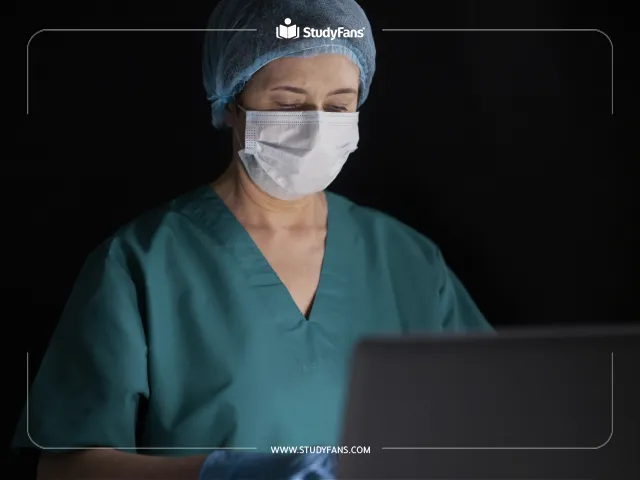Health information technology is an important area of study that should be prioritized as a major. In this article, we cover various different topics including what is health information technology, what the benefits of studying it are and the best universities to study health information technology in Turkey.
What is health information technology?
Before we talk about studying health information technology, let's discuss what health information technology is. Health information technology, sometimes abbreviated as HIT, is a field of study that discusses systems that take care of patient data and help improve patient care.
Those who work in the field carry out different job roles, such as developing and maintaining these systems, analyzing data from these systems and dealing with electronic records. Electronic patient records are a revolutionary part of modern healthcare, as healthcare information systems can truly enhance quality of healthcare.
Importance of health information technology studies
So, why are health information technology studies important? The new systems used thanks to health information technology studies can help health care workers analyze and find trends when it comes to patient information. This leads to benefits like the following:
Improved healthcare delivery
Enhanced patient safety
Improved engagement levels between patients and providers
Decreased medical errors due to human error
Information can also be handed off to government health agencies, leading to the following benefits:
Improved planning and implementing of general healthcare policies
Better treatment of diseases and enhanced prevention of the spread of deadly diseases.

Studying health information technology
Health information technology is a critical area, especially as technologies advance. In this section, we discuss why students should pick health information technology as a major, as opposed to other majors.
Why study health information technology?
There are many reasons why students should choose to study health information technology. Here are some of the most important reasons:
Job Growth
There's an increasing demand for health information technology workers as more health organizations implement electronic healthcare systems to keep up with the new world. Professionals will be needed to manage and analyze this health data.
Many Career Options
The field offers a wide range of career options for graduates. For example, they can work in healthcare organizations, government agencies and even consulting firms, among many other options.
When it comes to specializations, health information technology students can decide to specialize in many areas. These areas are like electronic healthcare systems, data analytics, information security or telehealth.
Critical Impact on Healthcare
Health information technology professionals play an important part in improving patient healthcare by managing and analyzing healthcare data. They also help in reducing medical errors, improving patient privacy and security and streamlining operations in healthcare facilities.
Competitive Salaries
The final benefit of studying the field of health information technology are the competitive salaries offered after graduation. Because they offer unique and specialized skills in healthcare management, they are well-compensated for their knowledge. Professionals working in the field receive impressive salaries and have good job stability.
Specializations of health information technology
When it comes to specializations of health information technology, students can choose to specialize in any of the following:
Public Health
Students interested in global health can choose to specialize in public health informatics, using his or her knowledge to help raise awareness of public health issues and allow accessibility to important health information. More diseases are being identified each year, leading to the need for public health information professionals to help deal with immunisations and related topics.
Clinical Informatics
Clinical informatics is another critical specialization that students can choose, utilizing information technology to extract healthcare data to offer top-notch healthcare services to patients. This specialization focuses on health system design and implementation, clinical decision support and promotion of information technology in a healthcare environment.
Health Administration
If students are more interested in the management or administrative areas of the healthcare organization, they can choose to specialize in health administration. In this specialization, they can work in health insurance, government and technology firms or health care organizations.
Students will learn how to correctly extract information from patients, develop treatment plans and integrate medications into them. They also learn how to manage and log medical histories and efficiently use intelligent medical record systems in the healthcare environment.
Nursing
Of course, students may also choose to specialize in the area of nursing, as nursing is the backbone of any health organization. Nurses with clinical experience, and knowledge of electronic health records systems, are very high in demand due to their exclusive knowledge bases giving them a competitive edge.

Subjects covered in health information technology
Students who study health information technology will cover subjects such as the following:
Medical Terminology
Essentials of Anatomy and Physiology
Legal Aspects of Health Information Technology
Health Care Delivery Systems
Information Systems for Health Information Technology
Current Procedural Terminology (CPT) Coding
Quality Assurance and Compliance
Health quality management
Medical Coding courses
Health information technology internship course
Skills needed to work in health information technology field
As with working in any other field, health information technology students will need to acquire a combination of hard and soft skills. The accumulation of this skill combination is essential in order for them to succeed in the field.
Hard skills
Students in the health information technology field will need to focus on hard skills like the following:
Medical coding: health technologists will need to learn medical coding with the appropriate treatment codes, including the International Classification of Diseases (ICD-10), Healthcare Common Procedure Coding System (HCPCS) and diagnostic related group (DRG) codes.
Cybersecurity: because privacy is critical when it comes to healthcare data, it's essential for those working in the field to have a good knowledge of cybersecurity best practices. For example, they must ensure that firewalls and antivirus softwares are consistently up to date.
Data analysis: Another important hard skill for those in the field to have is data analysis, allowing them to analyze large amounts of data and extract trends to offer accurate and fruitful analysis.
Soft skills
When it comes to soft skills, students should focus on developing these skills:
Communication: because health information technology professionals act as liaison between health care professionals and information technology, their communication skills must be top-notch. This is because they'll need to accurately explain complex technological concepts in simple language that healthcare professionals can understand.
Problem solving skills: As with work in any field, especially technology related ones, graduates must be able to effectively solve problems by thinking on their feet.
Teamwork: health information technology professionals always work in teams whether with other professionals or healthcare stakeholders, meaning they will need to have refined teamwork skills.
Ethics: health information technology is sensitive by nature, making adherence to ethical guidelines crucial for those in the field.

Top universities to study health information technology in Turkey
If you want to study health information technology in Turkey, you’ll surely want to know what the top universities to study at are. We’ve rounded up the best schools to pursue the study of health information technology so you know exactly where to apply.
İstanbul Esenyurt University
Istanbul Esenyurt University offers a program in Health Institutions Management, costing 2400 USD for the entire semester if you choose to study without a thesis program and 3250 USD for the entire semester if you choose to study a thesis program. The Turkish Esenyurt University was founded by the Yesilkoy Foundation for Education, Health and Culture in 2013 in bustling Istanbul as a private, non-profit institution with a great value to education.
Bahcesehir University
Bahcesehir University, often known as BAU, offers an exciting program in Health Informatics, costing students 12,000 USD per semester, without a thesis, or 14,000 USD per semester with a thesis program. Like many other Turkish schools, BAU is a private university in Istanbul located next to the Bosphorus, where many international students flock to pursue their degrees. What’s unique about the school is that it was one of the first Turkish universities to offer students programs in the English language.
Uskudar University
Another good school in Turkey to study health information technology is Uskudar University, which offers a great program in Health Informatics. The program costs students 3870 USD if they will pursue it with a thesis, and 3465 USD if they’ll study it without the thesis component. A modern Turkish university, Uskudar University uses the latest technologies for students to take advantage of during their study program, allowing it to reach the number 70 rank among Turkish universities.
Jobs for health information technology graduates
After graduation from the unique major of health information technology, students can choose to work in many different roles. From health information technicians to chief technology officers, the sky's the limit for graduates of the field.
Health information technician
Average salary: $49,601
Health information technicians are IT professionals who deal with the organization’s healthcare data and technology. Job roles include ensuring correct and secure data storage, efficiently organizing patient records allowing easy access for medical professionals and updating an organization’s medical databases and insurance records.
Medical coder
Average salary: $52,746 per year
Medical coders are coding specialists who help process insurance claims, by designating codes to different medical diagnoses. They also review data for insurance claims to check if it has the correct and accurate information and communicate with insurance companies to see how much coverage a patient is entitled to in each specific case.
Clinical informaticist
Average salary: $94,835 per year
A clinical informaticist analyzes data and technology use in healthcare settings. They help collect and manage clinical data such as healthcare records and patient information and recommend, based on their expertise, how the healthcare institutions can better organize data and implement protocols.
Analytics consultant
Average salary: $89,122 per year
Analytics consultants come up with new processes for data analytics by collecting massive amounts of information through data mining. They then evaluate how the medical businesses perform in the market and lead auditing teams to review high volumes of data and reach fruitful conclusions to benefit the business.
Chief technology officer
Average salary: $177,383 per year
Finally, perhaps the highest level technology executive is the Chief Technology Officer, or CTO. The CTO supervises and evaluates how an organization should take advantage of technology and different tech tools. They also make sure the hardware and software used can improve the business and find out if new technology products can be introduced.
How Can StudyFans Help You Study Health Information Technology in Turkey?
StudyFans can help ease your Turkish study journey, including helping you join the dream school for you in Turkey. Here are some of the top ways that Study Fans can help streamline your study abroad adventure and make it a breeze:
Offer a great source of reliable information about Turkish universities and the majors and degree programs they offer students.
Help answer any questions students may have about studying abroad in Turkey, assisting them so they know exactly how to study in Turkey.
Help students to directly apply to their dream university through the StudyFans portal and get an easy acceptance!
Offer students impressive discounts on tuition fees and exclusive scholarships, only available to those who apply through StudyFans.
Free applications to private universities, for any students who apply through StudyFans
Help with logistics and follow-ups with students during their entire study period, such as the following:
Picking up students from the airport and taking them to their residence
Helping offer temporary accommodation till they settle into their dormitories or permanent housing options (which we can also help them acquire)
Assisting with acquiring a study visa or Turkish residence permit and health insurance
Helping students open a Turkish bank account
Translating official documents and transcripts that are needed
Acting as a legal representative in place of parents for students under 18 years of age, to finish legal procedures
Frequently asked questions about health information technology studies
Q: What does a health information technology professional do?
A: Health information technology professionals work with patient database software applications and deal with the technological aspects of processing, storing, organizing and exchanging healthcare data.
Q: How much does a professional in health information technology make, on average?
A: Salaries for professionals in this field vary, between $35,080 and $77,810, with a median wage of $48,780 per year. Those who work in managerial positions, or in data analysis, may have the opportunity to make more money.
Required Documents To Study Health Information Technology
To study health information technology in Turkey, you'll need to hand in the following documents:
High school diploma, with a minimum score of “C”
Valid form of student identification, whether a passport or other official document
Proof of English proficiency certificate such as TOEFL or IELTS, if any, (if the student prefers to study in English)
Proof of Turkish language proficiency, if the course is in Turkish
Application fee paid (for some universities)
Wrap Up About Studying Health Information Technology in Turkey
In conclusion, studying health information technology is a great decision to make for students who want to have exciting careers and earn great salaries after graduation. If you are asking why study health information technology, you may also consider the fact that you will have a profound impact on the healthcare field and many career options to choose from after you finish your degree.
If you wanted to know more or have any questions, we are here to help you and you can always contact us:
Phone: 00905437394024
Or via WhatsApp through this link.





